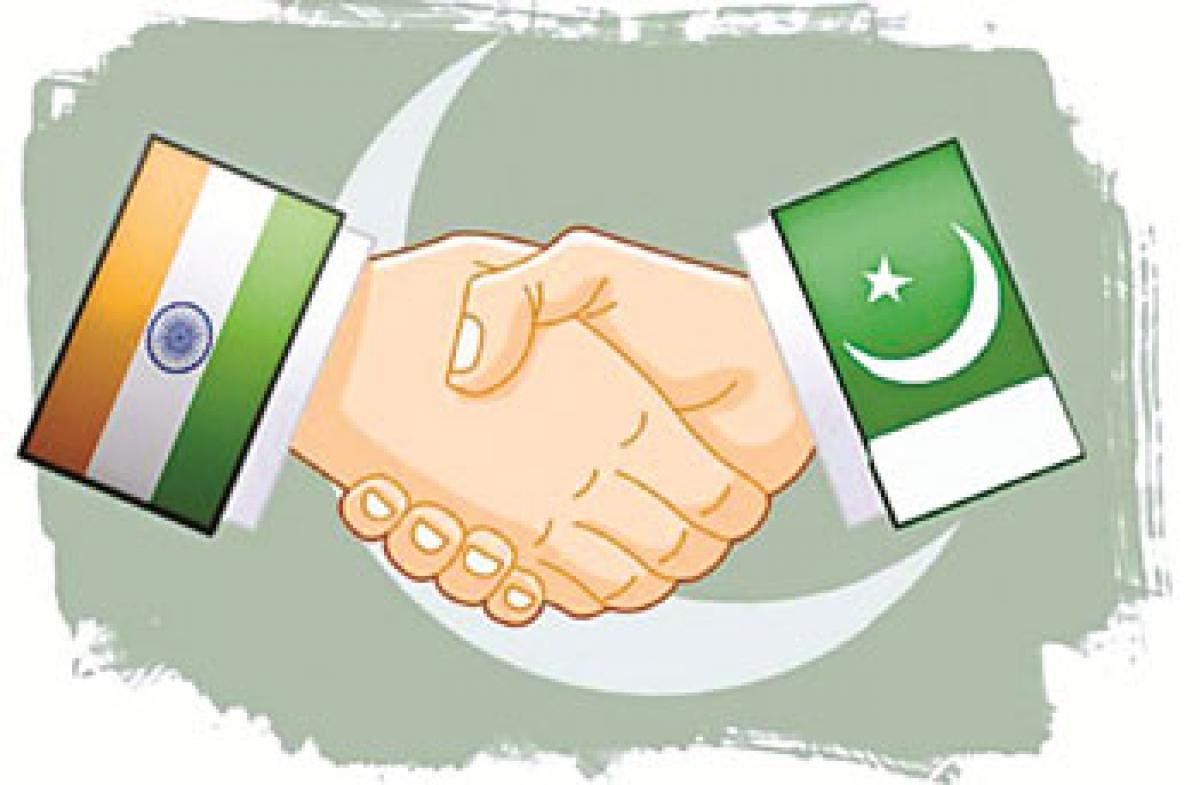Live
- BJP to Hold Workshop, Plans Statewide Yatras and Rallies
- Yemen's Houthis claim hitting 'vital target' in Israel with drones
- Group-III examination centers were inspected at the field level by District Collector Adarsh Surabhi, SP Raula Giridhar IPS Wanaparthy
- Minister Nara Lokesh Pays Emotional Tribute to Late Nara Rammurthy Naidu
- Bihar: Deceased patient's eye missing, RJD condemns incident at Nalanda Medical College
- Rammurthy Naidu's Last Rites Held in Naravari Palli
- PM Modi receives ceremonial welcome in Abuja, begins bilateral talks with Nigerian President Tinubu
- Goods traffic doubles on the new railway freight corridors
- BGT 2024-25: I’d like to see him make one more Test ton in Australia, says Johnso
- Harassment due to ED raids forced Kailash Gehlot to quit, hints Kejriwal
Just In

The Indo–Pak talks punctuated by intermittent breakdown and political uncertainty have once again resumed, giving fresh hopes of peace and stability in the region. Foreign Minister Sushma Swaraj is travelling to Islamabad to meet Pakistan Prime Minister Nawaz Sharif.
 The Indo–Pak talks punctuated by intermittent breakdown and political uncertainty have once again resumed, giving fresh hopes of peace and stability in the region. Foreign Minister Sushma Swaraj is travelling to Islamabad to meet Pakistan Prime Minister Nawaz Sharif.
The Indo–Pak talks punctuated by intermittent breakdown and political uncertainty have once again resumed, giving fresh hopes of peace and stability in the region. Foreign Minister Sushma Swaraj is travelling to Islamabad to meet Pakistan Prime Minister Nawaz Sharif.
The high-level political contact is a continuation to the NSA-level talks. The Indo-Pak diplomacy traversed many thorny goal posts since Prime Minister Narendra Modi assumed office. It all began with Modi’s neighbourhood diplomacy as Sharif graced his swearing-in ceremony.
But, this bonhomie did not long last. The Secretary-level talks were abruptly called off by India, protesting against the Pakistani envoy talking to Kashmiri separatists. While disapproving of the objectionable behavior of Pakistani diplomat, we in these columns described India’s reaction as shortsighted.
India agreeing for sudden resumption of talks even when the outstanding issues like terrorism remain unresolved validates our editorial stand that the Modi government has taken a hawkish stand by calling off talks.
The pathway to the Indo-Pak interaction is patchy and uncertain. The process of Indo-Pak dialogue is always vulnerable as sinister forces across the border are hell-bent on disturbing peace talks. India should never play into the hands of such forces having vested interest in perennial hostility between these two strategic South Asian neighbours.
Pakistan is a reality. India cannot alter its geography. The military adventurist, religious fanatics, collaborators of terror apparatus and the opportunist politicians use anti-India rhetoric and action for their domestic maneuvering. But, India believes that it is in the interests of the entire subcontinent that Pakistan should be stable and prosperous.
The Indo-Pak bilateral dialogue would significantly contribute to the regional stability. Kashmir and terrorism are intractable issues. No deadlines can be enforced on achieving result on this front. Harping on such complex bilateral disputes is against the spirit of pragmatic diplomacy.
But, India should continue to hold its position on these issues. But at the same time, it is in our national interests to ensure that such obstinate issues do not hold the entire peace process to ransom.
There are certainly many things both the nations can agree upon. Fostering bilateral, economic, trade partnership will bring economic gains for both the nations beset with common challenges like poverty, multiple deprivation etc.
The two nuclear neighbours cannot resolve their mutually conflicting positions through use of force. The world cannot allow the subcontinent to reach anywhere nearer nuclear flashpoint. The only way to frustrate the evil designs of anti-Indian forces in the political and military establishment of Pakistan is to create strong stakes for Pakistani civil society in the peace process.
This requires significant augmentation of economic and trade ties between the two nations. Besides, India and Pakistan should immediately resume a composite dialogue on all outstanding issues including Kashmir and cross border terrorism with a focus on economic, trade, cultural relations that can yield rich dividends without any insurmountable hurdles. The fragility on the Indo-Pak border should be addressed through Confidence Building Measures (CBMs). Political dialogue is essential to effectuate such diplomacy.

© 2024 Hyderabad Media House Limited/The Hans India. All rights reserved. Powered by hocalwire.com







